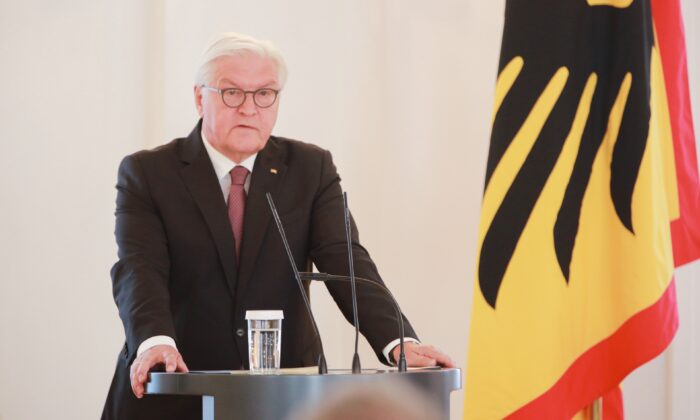Amid criticisms of Germany’s lack of response to Beijing’s imposition of the new national security law on Hong Kong, Germany’s president and foreign minister spoke out about future consequences for EU–China relations.
On Sunday, President Frank-Walter Steinmeier told German public TV network ZDF: “The violation of international law has been documented twice. … What matters is, we are now making it clear to China that this is not a temporary indignation.”
He said if the Chinese regime continues implementing the legislation, it will cause “a sustainable, negative change to the European, and Western countries.”
Steinmeier said China would not benefit from that situation, and hoped “there are ways to reverse Chinese thinking.”
 German Foreign Minister Heiko Maas speaks during a joint press conference in Berlin, Germany, on July 2, 2020. (Michael Sohn/Pool/AFP/Getty Images)
German Foreign Minister Heiko Maas speaks during a joint press conference in Berlin, Germany, on July 2, 2020. (Michael Sohn/Pool/AFP/Getty Images)The same day, foreign minister Heiko Maas told German newspaper RND that he believed the European Union should take a unified stance, and he will work with EU foreign minister Josep Borrell to develop a response to China.
“As EU Foreign Ministers, we have taken a very clear stance on the new security law for Hong Kong. Above all, we made it clear that the principle of ‘one country–two systems’ must not be undermined. This is what we expect from China,” he said.
“We will now discuss the consequences of the security law for our relations with China and Hong Kong. Initial proposals will be made on Monday.
“I am firmly convinced that we can only make headway with China if we speak with one EU voice. As EU Presidency, it is our priority to forge the common EU position together with Josep Borrell.”
However, he remained cautious on the issue: “First of all, Europe must be careful not to get under the wheels in the great power rivalry between the USA and China.”
Trade Relations and Democracy
Economy and Energy Minister Peter Altmaier said Germany should not decouple from China economically, following Germany’s long-held stance that trade with China will lead to Democratic changes in the country, according to Deutsche Welle.
 German Economy Minister Peter Altmaier makes a statement in Berlin, Germany, on June 24, 2020. (John Macdougall/AFP via Getty Images)
German Economy Minister Peter Altmaier makes a statement in Berlin, Germany, on June 24, 2020. (John Macdougall/AFP via Getty Images)“It has always been the policy of the Western international community, including the EU, that international trade relations cannot be based solely on how democratic a country is,” Altmaier told German newspaper Frankfurter Allgemeine Zeitung, according to Deutsche Welle.
“We have never done that,” he added.
But he doesn’t think doing business with authoritarian regimes is sustainable.
“I’m not the world’s headteacher of morality, but I am convinced that countries like China will only be successful in the long term if fundamental principles of the rule of law are guaranteed,” he said.
Support and Criticism
Mareike Ohlberg, a senior fellow in the Asia Program of the German Marshall Fund, praised the foreign minister for speaking up, but she urged the German government to recognise reality and take action.
“It’s great to see Germany finally speak up, but you see, 1C2S [one country two systems] was already smashed to pieces, so now is a time for action: 1. revise treaties with HK, 2. sanction CCP & HK officials, 3. facilitate immigration int[o] the EU for HKers who don’t want to live under a rule-by-law system,” Ohlberg wrote in a tweet.
It’s great to see Germany finally speak up, but you see, 1C2S was already smashed to pieces, so now is a time for action: 1. revise treaties with HK, 2. sanction CCP & HK officials, 3. facilitate immigration int the EU for HKers who don’t want to live under a rule-by-law system https://t.co/pww7xzAGBR
— Mareike Ohlberg (@MareikeOhlberg) July 12, 2020
 Norbert Roettgen, a prominent member of the German Christian Democrats (CDU) and former German environment minister, speaks to the media in Berlin, Germany, on Feb. 18, 2020. (Sean Gallup/Getty Images)
Norbert Roettgen, a prominent member of the German Christian Democrats (CDU) and former German environment minister, speaks to the media in Berlin, Germany, on Feb. 18, 2020. (Sean Gallup/Getty Images)
Before the president and the foreign minister’s interviews, the federal government’s lack of response to the Chinese Communist Party’s national security law had garnered criticism.
Germany had summoned Chinese ambassador Wu Ken on July 10, and state secretary Miguel Berger “repeated the German government’s position” on Hong Kong, according to the Sueddeutsche Zeitung newspaper.
And government spokeswoman Martina Fietz said at a press conference that “the concrete design of the security law will be examined and its implementation closely monitored.”
However, no clear words of criticism had been heard from the federal chancellery. Chancellor Angela Merkel’s reserved position with regard to China had even caused irritation in her own ranks.
As the Financial Times (FT) reported, Norbert Röttgen, a CDU politician and chairman of the Foreign Affairs Committee in the German Bundestag, said, “What the German government said about Hong Kong was the absolute minimum, and it just wasn’t enough.”
The foreign policy spokesman for the SPD parliamentary group, Nils Schmid, also told the FT that Merkel’s China policy was “behind the times.”
“She still sticks to this idea of convergence, that as we deepen our economic ties with China, it will become more liberal and Western-oriented. … But that’s just out of date,” he said.
Von Reinhard Werner of the German edition of The Epoch Times contributed to this report.
Focus News: German President and Foreign Minister Speak Out on Hong Kong
